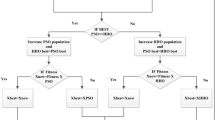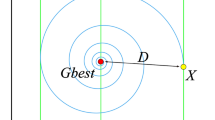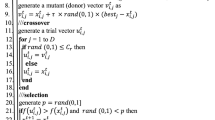Abstract
This paper presents a new hybrid genetic-particle swarm optimization (GPSO) algorithm for solving multi-constrained optimization problems. This algorithm is different from the traditional GPSO algorithm, which adopts genetic algorithm (GA) and particle swarm optimization (PSO) in series, and it combines PSO and GA through parallel architecture, so as to make full use of the high efficiency of PSO and the global optimization ability of GA. The algorithm takes PSO as the main body and runs PSO at the initial stage of optimization, while GA does not participate in operation. When the global best value (gbest) does not change for successive generations, it is assumed that it falls into local optimum. At this time, GA is used to replace PSO for particle selection, crossover and mutation operations to update particles and help particles jump out of local optimum. In addition, the GPSO adopts adaptive inertia weight, adaptive mutation parameters and multi-point crossover operation between particles and personal best value (pbest) to improve the optimization ability of the algorithm. Finally, this paper uses a nonlinear constraint problem (Himmelblau’s nonlinear optimization problem) and three structural optimization problems (pressure vessel design problem, the welded beam design problem and the gear train design problem) as test functions and compares the proposed GPSO with the traditional GPSO, dingo optimization algorithm, whale optimization algorithm and grey wolf optimizer. The performance evaluation of the proposed algorithm is carried out by using the evaluation indexes such as best value, mean value, median value, worst value, standard deviation, operation time and convergence speed. The comparison results show that the proposed GPSO has obvious advantages in finding the optimal value, convergence speed and time overhead.







Similar content being viewed by others
Data availability
Enquiries about data availability should be directed to the authors.
References
Abbassi A, Ben Mehrez R, Bensalem Y, Abbassi R, Kchaou M, Jemli M, Abualigah L, Altalhi M (2022) Improved arithmetic optimization algorithm for parameters extraction of photovoltaic solar cell single-diode model. Arab J Sci Eng. https://doi.org/10.1007/s13369-022-06605-y
Abd Elaziz M, Almodfer R, Ahmadianfar I, Ibrahim IA, Mudhsh M, Abualigah L, Lu S, Abd El-Latif AA, Yousri D (2022) Static models for implementing photovoltaic panels characteristics under various environmental conditions using improved gradient-based optimizer. Sustain Energy Technol Assess 52:102150. https://doi.org/10.1016/j.seta.2022.102150
Abdelhalim A, Nakata K, Alem ME, Eltawil A (2019) A hybrid evolutionary-simplex search method to solve nonlinear constrained optimization problems. Soft Comput 23(22):12001–12015. https://doi.org/10.1007/s00500-019-03756-3
Al-Bahrani LT, Patra JC (2018) A novel orthogonal PSO algorithm based on orthogonal diagonalization. Swarm Evol Comput 40:1–23. https://doi.org/10.1016/j.swevo.2017.12.004
Allawi HM, Al Manaseer W, Al Shraideh M (2020) A greedy particle swarm optimization (GPSO) algorithm for testing real-world smart card applications. Int J Softw Tools Technol Transf 22(2):183–194. https://doi.org/10.1007/s10009-018-00506-y
Al-qaness MAA, Ewees AA, Fan H, Abualigah L, Elaziz MA (2022) Boosted ANFIS model using augmented marine predator algorithm with mutation operators for wind power forecasting. Appl Energy 314:118851. https://doi.org/10.1016/j.apenergy.2022.118851
Alrufaiaat SAK, Althahab AQJ (2021) Robust decoding strategy of MIMO-STBC using one source Kurtosis based GPSO algorithm. J Ambient Intell Hum Comput 12(2):1967–1980. https://doi.org/10.1007/s12652-020-02288-1
Aravinth SS, Senthilkumar J, Mohanraj V, Suresh Y (2021) A hybrid swarm intelligence based optimization approach for solving minimum exposure problem in wireless sensor networks. Concurr Comput Pract E. https://doi.org/10.1002/cpe.5370
Chen CH, Li CL (2021) Process synthesis and design problems based on a global particle swarm optimization algorithm. IEEE Access 9:7723–7731. https://doi.org/10.1109/ACCESS.2021.3049175
Coello CAC (2000) Use of a self -adaptive penalty approach for engineering optimization problems. Comput Ind 41:113–127. https://doi.org/10.1016/S0166-3615(99)00046-9
Coello CAC, Montes EM (2002) Constraint- handling in genetic algorithms through the use of dominance-based tournament selection. Adv Eng Inf 16:193–203. https://doi.org/10.1016/S1474-0346(02)00011-3
Dimopoulos GG (2006) Mixed-variable engineering optimization based on evolutionary and social metaphors. Comput Methods Appl Mech Eng 196(4):803–817. https://doi.org/10.1016/j.cma.2006.06.010
Ekinci S, Izci D, Al Nasar MR, Abu Zitar R, Abualigah L (2022) Logarithmic spiral search based arithmetic optimization algorithm with selective mechanism and its application to functional electrical stimulation system control. Soft Comput. https://doi.org/10.1007/s00500-022-07068-x
Gao ZK, Li YL, Yang YX, Wang XM, Dong N, Chiang H-D (2020) A GPSO-optimized convolutional neural networks for EEG-based emotion recognition. Neurocomputing 380:225–235. https://doi.org/10.1016/j.neucom.2019.10.096
Garg H (2014) Solving structural engineering design optimization problems using an artificial bee colony algorithm. J Ind Manag Optim 10(3):777–794. https://doi.org/10.3934/jimo.2014.10.777
Garg H (2016) A hybrid PSO-GA algorithm for constrained optimization problems. Appl Math Comput 274:292–305. https://doi.org/10.1016/j.amc.2015.11.001
Guan JS, Hong SJ, Kang SB, Zeng Y, Sun Y, Lin C-M (2019) Robust adaptive recurrent cerebellar model neural network for non-linear system based on GPSO. Front Neurosci Switz 13:390. https://doi.org/10.3389/fnins.2019.00390
Guo WA, Si CY, Xue Y, Mao YD, Wang L, Wu QD (2018) A grouping particle swarm optimizer with personal-best-position guidance for large scale optimization. IEEE ACM Trans Comput Biol Bioinform 15(6):1904–1915. https://doi.org/10.1109/TCBB.2017.2701367
He Q, Wang L (2007) An effective co-evolutionary particle swarm optimization for constrained engineering design problems. Eng Appl Artif Intell 20(1):89–99. https://doi.org/10.1016/j.engappai.2006.03.003
He S, Prempain E, Wu QH (2004) An improved particle swarm optimizer for mechanical design optimization problems. Eng Optim 36(5):585–605. https://doi.org/10.1080/03052150410001704854
Hernan PV, Adrian FPD, Gustavo EC et al (2021) A bio-inspired method for engineering design optimization inspired by dingoes hunting strategies. Math Probl Eng 202:11–19. https://doi.org/10.1155/2021/9107547
Jamei M, Karbasi M, Mosharaf-Dehkordi M, Adewale Olumegbon I, Abualigah L, Said Z, Asadi A (2022) Estimating the density of hybrid nanofluids for thermal energy application: application of non-parametric and evolutionary polynomial regression data-intelligent techniques. Measurement 189:110524. https://doi.org/10.1016/j.measurement.2021.110524
Kharrich M, Abualigah L, Kamel S, AbdEl-Sattar H, Tostado-Véliz M (2022) An improved arithmetic optimization algorithm for design of a microgrid with energy storage system: Case study of El Kharga Oasis. Egypt J Energy Storage 51:104343. https://doi.org/10.1016/j.est.2022.104343
Liu Y, Mu CH, Kou WD, Liu J (2015) Modified particle swarm optimization-based multilevel thresholding for image segmentation. Soft Comput 19(5):1311–1327. https://doi.org/10.1007/s00500-014-1345-2
Mir M, Dayyani M, Sutikno T, Mohammadi Zanjireh M, Razmjooy N (2020) Employing a Gaussian particle swarm optimization method for tuning multi input multi output-fuzzy system as an integrated controller of a micro-grid with stability analysis. Comput Intell-US 36(1):225–258. https://doi.org/10.1111/coin.12257
Mirjalili S, Lewis A (2016) The whale optimization algorithm. Adv Eng Softw 95:51–67. https://doi.org/10.1016/j.advengsoft.2016.01.008
Mirjalili S, Mirjalili SM, Lewis A (2014) Grey wolf optimizer. Adv Eng Softw 69:46–61. https://doi.org/10.1016/j.advengsoft.2013.12.007
Rahman IU, Zakarya M, Raza M, Khan R (2020) An n-state switching PSO algorithm for scalable optimization. Soft Comput (Prepublish). https://doi.org/10.1007/s00500-020-05069-2
Salaria UA, Menhas MI, Manzoor S (2021) Quasi oppositional population based global particle swarm optimizer with inertial weights (QPGPSO-W) for solving economic load dispatch problem. IEEE Access 9:134081–134095. https://doi.org/10.1109/ACCESS.2021.3116066
Sheng ZQ, Li YH, Shi SS (2021) Multi-objective robust optimization of EMU brake module. In: 2021 IEEE 24th international conference on computer supported cooperative work in design (CSCWD) pp 702–707. https://doi.org/10.1109/CSCWD49262.2021.9437623
Song MX, Chen K, Wang J (2018) Three-dimensional wind turbine positioning using Gaussian particle swarm optimization with differential evolution. J Wind Eng Ind Aerodyn 172:317–324. https://doi.org/10.1016/j.jweia.2017.10.032
Su SB, Zhao W, Wang CS (2021) Parallel swarm intelligent motion planning with energy-balanced for multirobot in obstacle environment. Wirel Commun Mob Comput 2021:1–16. https://doi.org/10.1155/2021/8902328
Turgut MS, Turgut OE, Abualigah L (2022) Chaotic quasi-oppositional arithmetic optimization algorithm for thermo-economic design of a shell and tube condenser running with different refrigerant mixture pairs. Neural Comput Appl 34(10):8103–8135. https://doi.org/10.1007/s00521-022-06899-x
Zhang ZM (2021) Abnormal detection of pumping unit bearing based on extension theory. IEEJ Trans Electr Electron 16(12):1647–1652. https://doi.org/10.1002/tee.23468
Zhang WY, Zhang SX, Zhang S, Huang NN (2019) A novel method based on FTS with both GA-FCM and multifactor BPNN for stock forecasting. Soft Comput 23(16):6979–6994. https://doi.org/10.1007/s00500-018-3335-2
Zhao XR, Zhou YR, Xiang Y (2019) A grouping particle swarm optimizer. Appl Intell 49(8):2862–2873. https://doi.org/10.1007/s10489-019-01409-4
Funding
This work is supported by the Foundation for Innovative Research Groups of the National Natural Science Foundation of China (No. 51521003), Heilongjiang Province Postdoctoral Research Startup Fund (No. LBH-Q18059).
Author information
Authors and Affiliations
Contributions
Each author has equally contributed in conceptualization, model building, calculation and writing of the article.
Corresponding author
Ethics declarations
Conflict of interest
All authors declare that they have no conflict of interest.
Ethical approval
This article does not contain any studies with human participants nor any studies with animals, performed by any of the authors.
Informed consent
Informed consent was obtained from all individual participants included in the study
Additional information
Publisher's Note
Springer Nature remains neutral with regard to jurisdictional claims in published maps and institutional affiliations.
Rights and permissions
Springer Nature or its licensor holds exclusive rights to this article under a publishing agreement with the author(s) or other rightsholder(s); author self-archiving of the accepted manuscript version of this article is solely governed by the terms of such publishing agreement and applicable law.
About this article
Cite this article
Duan, B., Guo, C. & Liu, H. A hybrid genetic-particle swarm optimization algorithm for multi-constraint optimization problems. Soft Comput 26, 11695–11711 (2022). https://doi.org/10.1007/s00500-022-07489-8
Accepted:
Published:
Issue Date:
DOI: https://doi.org/10.1007/s00500-022-07489-8




